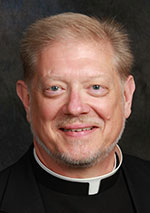That All May Be One / Fr. Rick Ginther
Respect for other religions a blessing on our faith journey
 Words are essential to understanding. Words convey meaning. And new words are surely an adventure!
Words are essential to understanding. Words convey meaning. And new words are surely an adventure!
On June 3, words filled the one-hour dedication celebration of the Al Huda Masjid in Fishers, Ind.
Al Huda is Arabic. It means “light of right guidance,” Imam Nasser Karimian noted as he welcomed all to this newest masjid in central Indiana.
Masjid, the imam went on to explain, is Arabic for what we western folks know as a “mosque.” Literally, it is a “place of ritual prostration.”
It became clear that a masjid is more than a building. Though usually a name for an Islamic place of worship, it can also be any act of worship that follows the Islamic rules of prayer. No matter where, the act creates a masjid.
With such new words in hand, we non-Muslims now had a better grasp of the significance of the place being dedicated.
Chanted verses then followed from the Qu’ran in Arabic by Sheikh Hamidullah Qeyam. The verses were translated immediately by Imam Nasser.
Speeches by state and local political leaders ensued.
Then Pastor Darryn Scheske of Heartland Church in Fishers told of the relationship his church has built through 20 years with Al Huda Foundation. He reflected upon the experience through the lens of Isaiah 58:6-12. It was a moving interreligious moment of Scripture supporting the cooperative compassion for those in need the masjid and church exercise in the community.
I sat with rabbis Dennis Sasso and Aaron Spiegel. Our Judeo-Christian ritual traditions were on our minds. We quietly compared our dedication liturgies to what we were gratefully experiencing.
The concluding reflection by Imam Nasser centered upon respect. He explored the difference between respect as “keep your distance” and “learning from each other.”
His thoughts have set my heart and mind humming since then.
Respect. A noun. A verb. Basic dictionary definitions state that it is “due regard for the feelings, wishes, rights or traditions of others” or “a feeling of deep admiration for someone or something.”
Respect comes from the Latin respicere, to “look back at, regard, consider.”
A related word in my mind is “reflect,” from the Latin reflectere, to “bend back, turn back,” as a mirror. Or “to turn one’s thoughts back on.”
True respect is relational. It calls for regarding the other with admiration and mirroring back to the other what is seen, heard or experienced with or through them.
Respect for another religion encompasses the same.
True religious respect, then, calls for learning about another religion or person, and reflecting what one learns of them back to the other.
But this is not a one-way exchange. It is mutual, an intersection of persons learning. It allows for clarification, greater understanding and a growing admiration.
It is sad today, as it has been in the past, that religions other than one’s own are seen as threats.
It is equally sad that religions other than one’s own remain at best mere curiosities. And often hollow caricatures.
It is a blessing when we can learn about the other, to share our own religious values and meaning with another, to admire more deeply the other, to witness the other’s worship and acts of charity.
I know from personal experience this is true. My own faith, understanding of and appreciation for Christianity and Catholicism grows through relations with “the other,” be they non-Christian or other Christian.
In the end, it bolsters my self-respect through the respect of and for the other.
(Father Rick Ginther is director of the archdiocesan Office of Ecumenism and Interreligious Affairs. He is also the pastor of Our Lady of Lourdes Parish, Indianapolis.) †
 Words are essential to understanding. Words convey meaning. And new words are surely an adventure!
Words are essential to understanding. Words convey meaning. And new words are surely an adventure!